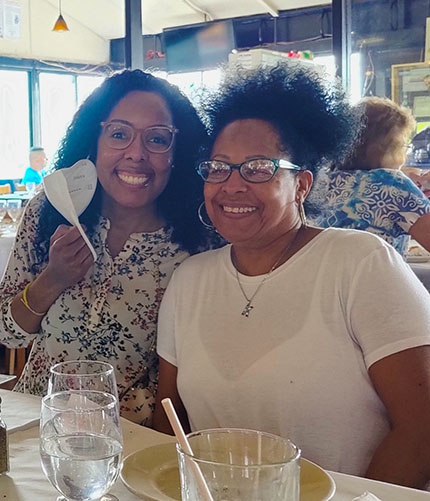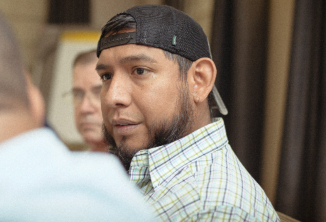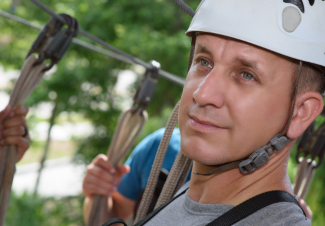Untangling Sleep Problems When You Have PTSD

Army veteran Raquel Rojas remembers the night she was jolted awake by her daughter.
“My daughter was tugging at me, yelling at me to breathe,” said Raquel, who was unaware that she’d been gasping for air while sleeping.
Raquel had gone to stay with her daughter, who had grown concerned about her mother’s post-traumatic stress disorder (PTSD). Although Raquel was getting care for her symptoms, sleep was a constant challenge.
“I would only sleep two or three hours, then I would wake up and just stay awake,” said Raquel.
After 24 years in the military, she assumed her PTSD was to blame for her ongoing insomnia. However, what neither of them realized was that Raquel’s nightmares and insomnia were being complicated by something else.
A sleep study at a local Veterans Affairs (VA) office revealed that something else was disrupting Raquel’s sleep. She was diagnosed with obstructive sleep apnea, a condition in which a person repeatedly stops and starts breathing while they sleep.
Sleepless in America
Sleepless nights are a frequent problem for veterans and civilians in this country. On average, people spend about one-third of their lives sleeping. According to the National Center on Sleep Disorders Research, 1 in 3 adults do not get the recommended amount of sleep, and about 50-70 million Americans have sleep disorders.
Sleep deficiency and untreated sleep disorders can contribute to various health issues such as:
- Obesity.
- Weakened immunity.
- High blood pressure.
- Risk for diabetes.
- Heart disease.
- Dementia.
Going without sleep or having poor-quality sleep can also lead to increased stress levels, heightened irritability, and PTSD flare-ups.
Veterans Struggle with Sleep
Raquel’s story echoes a troubling trend among veterans.
The Wounded Warrior Project® (WWP) Warrior Survey* indicates sleep is one of the most common health issues reported after military service, with 83% of WWP warriors reporting sleep challenges.
Trauma, chronic pain, and mental health conditions can often cause or worsen sleep problems. When these layers build on each other, it can be hard to pinpoint what’s causing the problem or what’s making it worse. Over time, many veterans get used to sleeping very little and begin to see it as their new normal.
The Warrior Survey also shows on average, WWP™ warriors sleep 5½ hours nightly and more than half say they have poor sleep quality.
How PTSD Can Impact Your Sleep
Most warriors in the WWP survey who had sleep problems also said they had experienced PTSD symptoms. In fact, 83% of warriors with sleep issues also reported having PTSD.
Multiple studies have explored the connection between PTSD and sleep. While sleep problems are among the criteria for diagnosing PTSD, research from the National Center for PTSD suggests that sleep issues are not just symptoms but a key feature of the condition.
PTSD and sleep disturbances often feed into each other, said Ashley Ross, deputy director of WWP’s Warrior Care Network®, an accelerated brain health program.
“Sleep helps restorative body-mind functions, and when you improve sleep, you’re better able to manage your mental health,” said Ross. “If your ability to function is impaired, your coping skills are affected too, making daily issues seem more challenging, especially for people with PTSD.”
Finding the Reason You Can’t Sleep
It’s common to hear veterans say, “I don’t need much sleep.”
Ross says that mindset makes it difficult to identify causes or even differentiate the cause from the effect. But understanding the root cause of sleep challenges is important to help guide veterans to the right support and resources.
 “Understanding if a veteran’s sleep challenges are caused by a physical issue, such as sleep apnea, or if they are related to an underlying mental health condition like PTSD, or if it’s both physical and mental, is critical to ensure they get the right treatment or access to resources to help their sleep but also to enhance their general well-being,” Ross said.
“Understanding if a veteran’s sleep challenges are caused by a physical issue, such as sleep apnea, or if they are related to an underlying mental health condition like PTSD, or if it’s both physical and mental, is critical to ensure they get the right treatment or access to resources to help their sleep but also to enhance their general well-being,” Ross said.
Learn more about the most common sleep issues affecting veterans
For Raquel, the full picture of her sleep problems was obscured by her flashbacks and nightmares.
“I was all over the place while I was active duty as an 88 Mike,” she said. “I did transportation and was in Iraq in 2003 and 2004. I spent time at Camp Anaconda, which was nicknamed ‘Mortaritaville’ because we were constantly under attack.”
She pushed aside her challenges with sleeplessness until her daughter convinced her to make it a priority.
Once she learned about her obstructed airway, Raquel got the medical treatment she needed. Over time, she began experiencing better quality sleep. But she still had to manage her PTSD.
When Mental Health Keeps You Awake
PTSD isn’t the only mental health challenge that disrupts sleep. Conditions like anxiety and depression can also negatively impact veterans’ sleep.
For Raquel, a lack of connection to other veterans made her transition to civilian life harder.
After separating from the military, she split her time between Florida and Puerto Rico, where she was born. “I didn’t know many veterans at first, and I felt very alone,” she said.
Finding WWP and getting support helped her feel less alone. She joined peer support groups, attended an all-female Project Odyssey® retreat, and began engaging in community events, all of which made a real difference in her mental health.
Project Odyssey is an adventure-based mental health program created to support wounded veterans who want to improve their mental resiliency. In addition to providing strategies to manage PTSD, Raquel met other women warriors who understood her struggles.
“Getting involved with Wounded Warrior Project helped me meet people and improve my confidence,” Raquel said. “Having a network of support, both from other veterans and from my family, helped me come back to myself.”
How WWP Supports Better Sleep for Veterans
WWP offers various programs that help veterans overcome the mental and physical barriers that can get in the way of good sleep.
In addition to Project Odyssey and WWP Talk, a non-clinical, goal-setting, and emotional support program, WWP offers resources for veterans who need more intensive mental health care.
“We know that some veterans have challenges with sleep due to problems with PTSD, but others may also have a traumatic brain injury, pain issues, or substance use challenges,” Ross said. “Warrior Care Network integrates clinical behavioral health care with other wellness services during an accelerated two-week timeframe to ensure each veteran is getting tailored treatment for their needs,” she added.
Additionally, Warrior Care Network helps match veterans with a local provider when they return home so they can continue receiving support.
WWP understands that physical health also plays a role in improving sleep quality.
”Lifestyle improvements are a key part of any plan to help veterans manage sleep challenges,” said WWP Physical Health and Wellness coach, Tim Lentine.
“Excess weight, substance use, and lack of movement can all contribute to sleep issues,” Lentine explained. “These are things we can help veterans manage to improve their overall well-being.”
WWP’s Physical Health and Wellness coaches work one-on-one with veterans (and their families) to identify lifestyle habits that can affect their sleep and then create a personalized plan for improvement.
“We equip participants with the tools to help improve not just their sleep but their lifestyle long-term,” said Lentine. “This could include developing a sleep hygiene plan, emphasizing daily movement or physical activity, and addressing nutrition and hydration. While each person is different, we know all these things can affect sleep.”
Clinical Treatment for Veteran Sleep Issues
Depending upon their specific sleep issues, veterans may also find traditional clinical treatments valuable. Lentine notes that the most common treatments include:
- Counseling to address untreated trauma or stress.
- Medication to help fall or stay asleep.
- Cognitive behavioral therapy.
- Medical intervention for conditions like sleep apnea.
“But it’s critical that veterans have an accurate diagnosis in order to find the best clinical and supportive treatments to help them improve their sleep,” Lentine said.
He adds that if warriors are unsure where to go, WWP can assist. The WWP Benefits Services team can help warriors review their benefits, which may include access to medical and mental health services through VA providers.
Supporting Veterans Every Step of the Way
For veterans like Raquel, overcoming sleep challenges is about more than rest; it’s about healing the mind and the body. Her journey highlights the value of having an accurate diagnosis and access to tailored care.
With support from family, peers, and health care professionals, more veterans can find better sleep and have an improved quality of life. That is why Raquel shares her story.
“I’m glad for the support I have received and to share my experiences, especially since what I do to improve my health might also help another soldier,” she said.
Want to make lifestyle improvements? Learn more about WWP's programs and resources.
*Warrior Survey, Wave 3 (conducted June 15 - Aug. 24, 2023)
Contact: Cynthia Weiss – Public Relations, cweiss@woundedwarriorproject.org, 904.738.2589
About Wounded Warrior Project
Wounded Warrior Project is our nation’s leading veteran services organization, focused on the total well-being of post-9/11 wounded, ill, or injured veterans. Our programs, advocacy, and awareness efforts help warriors thrive, provide essential lifelines to families and caregivers, and prevent veteran suicides. Learn more about Wounded Warrior Project.


